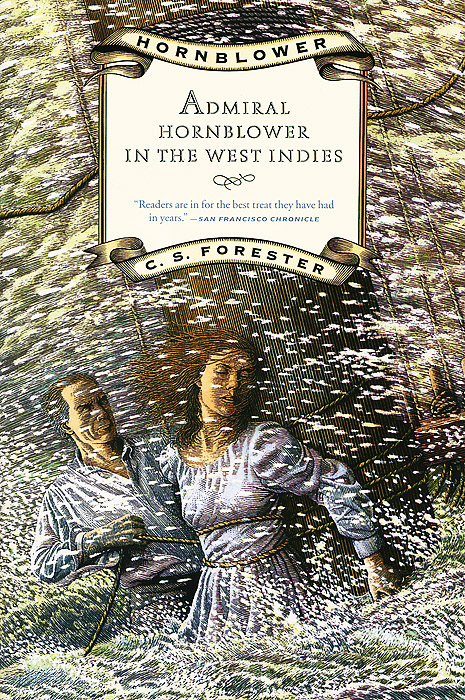Книга: C. S. Forester «Admiral Hornblower in the West Indies»

|
These thrilling tales of high-seas adventure in the Napoleonic era, which Winston Churchill found "vastly entertaining" and Ernest Hemingway recommended to "every literate I know", are being eagerly embraced by a new generation of readers. Back Bay takes pleasure in reissuing these classic tales in handsome new trade paperback editions. -- The Hornblower renaissance is in full sail with a nearly tenfold increase in sales: more than I5O, OOO Hornblower books sold in the first six months of 1999. - The A&E television network's series of original movies based on Hornblower's adventures have been tremendously successful - praised by critics, enjoyed by hundreds of thousands of viewers, and winner of the Emmy Award for best miniseries. - Two new movies will be premiering in the spring on A&E. - Readers and booksellers who admire Patrick O'Brian's novels delight in discovering this "new" series of nautical adventure stories. Издательство: "Back Bay Books" (2000) Формат: 140x210, 352 стр.
ISBN: 978-0-316-28941-2 |
Другие книги автора:
| Книга | Описание | Год | Цена | Тип книги |
|---|---|---|---|---|
| Hornblower and the "Hotspuk" | April 1803. The Peace of Amiens is breaking down. Napoleon is building ships and amassing an army just across the Channel. Horatio Hornblower - who, at age twenty-seven, has already distinguished… — Back Bay Books, (формат: 140x210, 400 стр.) Подробнее... | бумажная книга |
C. S. Forester
Infobox Writer
name=C. S. Forester
birthdate = Birth date|1899|8|27|mf=y
birthplace =
deathdate = death date|1966|4|2|mf=y
deathplace = Fullerton,
occupation = Novelist
nationality = flagicon|United Kingdom British
genre = Adventure,
debut_works =
Cecil Scott Forester was the
Biography
Born in
During
The
Forester wrote many other novels, among them "The African Queen" (1935) and "The General" (1936);
He wrote several volumes of short stories set during the Second World War. Those in "The Nightmare" (1954) were based around events in Nazi Germany, ending at the
His non-fiction seafaring works include "The Age of Fighting Sail" (1956), an unusually candid account of the Sea battles between Great Britain and the United States in the War of 1812.
In addition to his novels of seafaring life, Forester also published two crime novels, "
References
* John Forester: "Novelist & Storyteller. The Life of C. S. Forester", ISBN 0-940558-04-1 ( [http://www.csforester.org/info.asp excerpt] ).
External links
* [http://www.kirjasto.sci.fi/forester.htm Biography and Selected Works]
* [http://mwilden.com/forester/bibliography.htm Bibliography]
* [http://www.csforester.eu C.S. Forester Society]
*imdb name|id=0286163|name=C.S. Forester
Источник: C. S. Forester
См. также в других словарях:
Hornblower in the West Indies — Infobox Book name = Hornblower in the West Indies title orig = translator = image caption = author = C. S. Forester illustrator = cover artist = country = United Kingdom language = English series = Horatio Hornblower genre = Historical novel… … Wikipedia
The Commodore — This article is about the C.S. Forester novel. For the seventeenth novel in Patrick O Brian s Aubrey Maturin series, see The Commodore (novel). For other uses, see Commodore. The Commodore … Wikipedia
Horatio Hornblower — Admiral of the Fleet Horatio Hornblower, 1st Baron Hornblower, GCB, is a fictional protagonist of a series of novels by C. S. Forester, and later the subject of films and television programs. Ernest Hemingway is quoted as saying, I recommend… … Wikipedia
Mr. Midshipman Hornblower — … Wikipedia
Horatio Hornblower — Dibujo de un capitán de la Royal Navy a comienzos del siglo XIX. Horatio Hornblower es un personaje ficticio, creado por Cecil Scott Forester en 1937, protagonista de una serie de once novelas y dos relatos de ficción que narran sus vivencias… … Wikipedia Español
Death to the French — For the Wikipedia s treatment of anti French movements in the modern world, see Francophobia. Death to the French … Wikipedia
